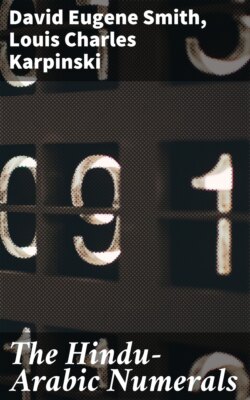Читать книгу The Hindu-Arabic Numerals - Louis Charles Karpinski - Страница 4
На сайте Литреса книга снята с продажи.
PRONUNCIATION OF ORIENTAL NAMES
ОглавлениеTable of Contents
(S) = in Sanskrit names and words; (A) = in Arabic names and words.
b, d, f, g, h, j, l, m, n, p, sh (A), t, th (A), v, w, x, z, as in English.
a, (S) like u in but: thus pandit, pronounced pundit. (A) like a in ask or in man. ā, as in father.
c, (S) like ch in church (Italian c in cento).
ḍ, ṇ, ṣ, ṭ, (S) d, n, sh, t, made with the tip of the tongue turned up and back into the dome of the palate. ḍ, ṣ, ṭ, ẓ, (A) d, s, t, z, made with the tongue spread so that the sounds are produced largely against the side teeth. Europeans commonly pronounce ḍ, ṇ, ṣ, ṭ, ẓ, both (S) and (A), as simple d, n, sh (S) or s (A), t, z. ḏ (A), like th in this.
e, (S) as in they. (A) as in bed.
ġ, (A) a voiced consonant formed below the vocal cords; its sound is compared by some to a g, by others to a guttural r; in Arabic words adopted into English it is represented by gh (e.g. ghoul), less often r (e.g. razzia).
h preceded by b, c, t, ṭ, etc. does not form a single sound with these letters, but is a more or less distinct h sound following them; cf. the sounds in abhor, boathook, etc., or, more accurately for (S), the "bhoys" etc. of Irish brogue. h (A) retains its consonant sound at the end of a word. ḥ, (A) an unvoiced consonant formed below the vocal cords; its sound is sometimes compared to German hard ch, and may be represented by an h as strong as possible. In Arabic words adopted into English it is represented by h, e.g. in sahib, hakeem. ḥ (S) is final consonant h, like final h (A).
i, as in pin. ī, as in pique.
k, as in kick.
kh, (A) the hard ch of Scotch loch, German ach, especially of German as pronounced by the Swiss.
ṁ, ṅ, (S) like French final m or n, nasalizing the preceding vowel.
ṇ, see ḍ. ñ, like ng in singing.
o, (S) as in so. (A) as in obey.
q, (A) like k (or c) in cook; further back in the mouth than in kick.
r, (S) English r, smooth and untrilled. (A) stronger. ṛ, (S) r used as vowel, as in apron when pronounced aprn and not apern; modern Hindus say ri, hence our amrita, Krishna, for a-mṛta, Kṛṣṇa.
s, as in same. ṣ, see ḍ. ś, (S) English sh (German sch).
ṭ, see ḍ.
u, as in put. ū, as in rule.
y, as in you.
ẓ, see ḍ.
‛, (A) a sound kindred to the spiritus lenis (that is, to our ears, the mere distinct separation of a vowel from the preceding sound, as at the beginning of a word in German) and to ḥ. The ‛ is a very distinct sound in Arabic, but is more nearly represented by the spiritus lenis than by any sound that we can produce without much special training. That is, it should be treated as silent, but the sounds that precede and follow it should not run together. In Arabic words adopted into English it is treated as silent, e.g. in Arab, amber, Caaba (‛Arab, ‛anbar, ka‛abah).
(A) A final long vowel is shortened before al ('l) or ibn (whose i is then silent).
Accent: (S) as if Latin; in determining the place of the accent ṁ and ṅ count as consonants, but h after another consonant does not. (A), on the last syllable that contains a long vowel or a vowel followed by two consonants, except that a final long vowel is not ordinarily accented; if there is no long vowel nor two consecutive consonants, the accent falls on the first syllable. The words al and ibn are never accented.
